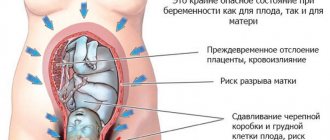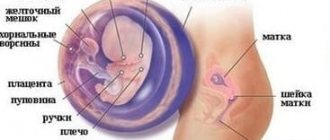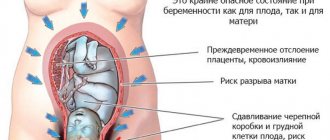Why does my stomach hurt at 9 weeks of pregnancy?
At the end of the first trimester, the well-being of the expectant mother undergoes changes, the body is rebuilt.
A woman's appetite increases, which causes digestive problems due to overeating - a natural cause of pulling sensations in the lower abdomen. Severe pain may indicate certain pathologies. They can provoke fetal freezing, even in the absence of bloody discharge.
When bleeding occurs, a miscarriage almost always occurs. Therefore, if you notice such a symptom, you need to call an ambulance.
A girl in position is hospitalized and given a drip with a hemostatic solution, most often etamsylate, dicinone, progesterone. They are prescribed to take Tranexam and Duphaston in the form of tablets. Intravaginal gel Kraynon.
Green, yellow (to orange) discharge with an unpleasant odor is considered a dangerous symptom. This is a sign of infectious diseases.
Other causes of pain:
- Pinching of the sacral plexus nerve – burning, intense pain, including headache.
- Exacerbation of intervertebral disc dysfunction;
- Acute stages of chronic diseases of the intestinal tract, cholecystitis, gastritis - a pulling feeling in the navel area.
- Cystitis – painful urination, dark urine, discomfort in the lower abdominal cavity.
Cystitis needs to be taken seriously. This is not the most dangerous disease during pregnancy, but it leads to genital tract infection.
Bleeding
Pain in the lower abdomen and lower back can result in bleeding at 9 weeks of pregnancy. In this case, there is no way to hesitate: lie down and call an ambulance, and if possible, immediately go to the hospital yourself. Bleeding should be considered the release of blood in any amount. At the 9th week of pregnancy, menstruation no longer occurs, although there is a medical term for “fetal ablution” - a condition in which menstrual-like bleeding occurs despite the pregnancy developing in the body. But in this case, you would hardly already know that life had arisen inside you.
Bleeding at 9 weeks of pregnancy may be a sign of cervical erosion or some kind of neoplasm. In this case, the nagging cramping pain in the lower abdomen will be absent. But still, the doctor must determine the cause.
What causes nagging, aching pain during pregnancy?
Any unpleasant sensations at nine weeks cause panic in the mother. But the sensations do not always pose a danger to the child and are accompanied by termination of pregnancy. Often the cause of pain is uterine hypertonicity.
It is dangerous if it persists for a long time, it can lead to rejection of the fertilized egg, but most often it passes quickly and is considered not dangerous. Pain as during menstruation, heaviness at the bottom, muscles are compressed and hard.
It may appear due to:
- compression of blood vessels, muscle strain;
- insufficient amount of oxygen reaching the baby;
- poor nutrition of the brain and nerve system;
- severe stress and anxiety of the expectant mother.
With increased tone, the well-being of the fetus worsens. The method for determining muscle tension disorders in the body is ultrasound. It shows from which side the pathology develops and how strongly.
Doctors usually prescribe drugs that have antispasmodic, myotropic, vasodilator, and hypotensive effects:
- No-shpa
- Papaverine.
- Duphaston.
Sometimes magnesium B-6. Physical and sexual rest and bed rest are prescribed. Sometimes hospitalization and the use of a sedative are required.
Fetus
This tiny embryo continues to grow, reaching 22 to 25 mm and weighing 3 to 7 grams. From this moment on, obstetricians call the embryo a fetus. The formed main internal organs, nervous system and brain are developing by leaps and bounds.
At the 9th week, such vital organs as:
- the cerebellum, which will coordinate the baby’s movements;
- the pituitary gland, which further regulates the production of hormones;
- the middle layer of the adrenal glands, responsible for the amount of adrenaline;
- lymph nodes;
- cranial nerves, as well as intervertebral and spinal nerves.
But this is not all that the baby can boast of, because now his genitals are forming and very soon the gender of the child will be known. In addition, the baby’s urination process has already been established, and the child’s face is increasingly taking on shape. He can already squeeze his lips and perform the swallowing reflex. The arms and legs also become “humanized” – fingers with nail phalanges appear, and the foot enlarges.
The muscular system covers the body more and more and the bones become stronger.
Fetus at 9 weeks of gestation
The vital activity of the fetus is still supported by the resources of the corpus luteum, but the umbilical cord becomes longer and already transfers the waste products of the embryo to the mother’s body. This is where changes in the sensations of a pregnant woman begin.
The umbilical cord consists of 3 vessels, one of which transfers nutrients to the child, and two remove waste products of metabolic processes.
How children can help with treatment
Mother needs complete rest. It is best to lie down and get up only when needed and to eat food. It’s good when a woman has assistants. If pregnancy and the upcoming birth are not the first, then older children can help with household chores.
The most important help is to ensure peace of mind for the pregnant woman. If the difference between children is small, you need to place the child in the care of a second adult. After all, a small child needs his mother most of all, and then there is no peace.
What does dull, pulling, point or cutting pain in the abdomen indicate?
Stomach pain during pregnancy is due to changes in the body, in organs associated with hormonal changes, changes in the position of internal organs, and obstetric pathologies.
Many types of these sensations do not pose a threat to the health of the mother or the condition of the fetus. Others cause significant harm and even death to the woman and the unborn child.
Pain is a reaction of the nervous system to stimuli. A symptom of many diseases, including obstetric pathologies during pregnancy. A pregnant woman experiences hormonal changes and a restructuring of many systems. They are also accompanied by this feeling.
If discomfort and pain occur, it is better to consult with your doctor about the nature of these sensations and appropriate treatment. During pregnancy, a woman is responsible not only for her own health, but also for the health of the baby.
Nature has determined that the mother’s body tries to protect the fetus from all negative influences. A plug formed from mucus in the cervix prevents pathogenic microorganisms from entering.
Umbilical cord nutrition is formed in such a way that harmful chemical compounds do not enter the fetus. The uterus itself protects the child from external mechanical influence.
At the same time, during the period of bearing a baby, the woman herself may regularly experience pain of varying intensity and nature. Each type of discomfort indicates the presence of different pathological conditions, with the exception of harmless obstetric ones associated with changes in the maternal body and preparation for childbirth.
Based on the nature, intensity of pain, and gestational age, we can talk about how dangerous the condition is.
For example, pulling, extending to the lower back and groin, may indicate a risk of miscarriage. An additional sign of the condition will be the presence of bloody discharge.
In this case, you should immediately seek medical help and undergo an examination. If you delay visiting a doctor, the frequency of contractions will become more frequent and spontaneous miscarriage will occur.
Uterine tone is dangerous regardless of how early it was diagnosed. The fetus may experience a lack of oxygen and incoming nutrients. The woman feels a sharp pain like contractions. The solid state of the uterus and lower abdomen is recorded.
In case of injury, late toxicosis, or stress, placental abruption may occur. The condition is accompanied by acute pain in the lower abdomen. Often there is internal bleeding without external manifestations in the form of discharge. Urgent hospitalization and surgical intervention are required. Without help, death will occur.
Cramps accompanied by dizziness at five to twelve weeks can be a symptom of an ectopic pregnancy. For a number of reasons, the egg was unable to enter the uterus and became embedded in the fallopian tube.
As a result of the rapid growth rate of the fertilized egg, severe pain occurs. The woman is sent for an ultrasound examination. An operation to terminate the pregnancy is prescribed. Lack of medical care will result in death for the pregnant woman.
A number of non-gynecological problems also contribute to the occurrence of unpleasant sensations in the lower abdomen:
- Disruption of the gastrointestinal tract. Additional symptoms: bitterness in the mouth, tingling in the lower abdomen, heartburn.
- Inflammation of the bladder and urinary tract. Symptoms: discomfort and burning when urinating, increased frequency of the urge to urinate, increased body temperature.
- Seasonal colds. They are accompanied by headaches, nasopharyngeal congestion, aching bones, and fever.
- Inflammation of the appendix (appendicitis). An acute condition in which severe vomiting occurs, weakness, and a strong increase in temperature are detected. Surgery is used to remove the inflamed area. This procedure is safe for a pregnant woman. Abdominal laparotomy appendectomy is used if peritonitis is suspected and less invasive laparoscopy is used if there are no signs of peritonitis. A course of rehabilitation therapy is prescribed.
It is possible to diagnose the pathology based on additional symptoms. Treatment should be supervised by medical professionals. It is prohibited to take pharmaceutical drugs on your own. If you aggravate your own condition through inept actions, this will inevitably affect the child’s development.
Discharge
Discharge at the 9th week of pregnancy, which does not pose any danger - discharge in moderate quantities, light, milky in color, without a strong pronounced odor. The appearance instead of yellow, green or purulent, bubbling or cheesy discharge with an unpleasant odor, and even against the background of severe discomfort in the form of burning or itching in the genital tract, is evidence of the development of one of the infectious diseases that awaits a woman. This cannot be done without the participation of medicine - having identified the pathogen and diagnosed the disease, the doctor will prescribe adequate treatment to prevent infection from reaching the fetus.
Of course, there can be no talk of spotting in the 9th week of pregnancy: menstruation has long since ceased and should not have happened, and blood on panties, even in the form of spotting brown discharge, is a reason to seek medical help as soon as possible. You should especially react promptly if spotting brown discharge or bleeding appears in parallel with abdominal pain - almost certainly there will be a risk of miscarriage.
Bloody discharge can also be caused by erosion of the cervix, indicating any unfavorable neoplasms. But if the appearance of blood is associated with erosion of the cervix, there is no pain in the abdomen. Be that as it may, there should be no bleeding at all, and the cause of their occurrence should be trusted to be determined by a doctor, to whom you should be sent immediately upon detection of blood.
Ultrasound at 9 weeks of pregnancy
Sometimes an ultrasound examination may be needed to diagnose and evaluate the progress of pregnancy. Using an ultrasound, a specialist will assess the condition of the uterus and fetus, make forecasts for the future, and more accurately determine the duration of pregnancy.
In addition, it is now possible to evaluate the motor activity of the embryo - an ultrasound examination will show how the baby moves its arms and legs, and will show whether the baby is sleeping or awake. Although the woman, of course, will not feel this “awakeness” yet - the movements and tremors of the baby will become noticeable only by the 4-5th month of pregnancy.
But now, during an ultrasound session, the expectant mother can already see the outlines of the baby, hear how quickly his tiny heart beats: at this stage, the fetal heart rate averages 130-150 beats per minute.
Especially for beremennost.net – Elena Kichak
When do you need to see a doctor urgently, and which doctor will help?
Cases of pain where medical intervention cannot be avoided:
- Cramping attacks of a pulling nature (especially in the first trimester of pregnancy) - you need to immediately seek help. There is a high risk of miscarriage or placental abruption. The presence of mucous discharge mixed with blood is a reason to call an ambulance for immediate hospitalization of the patient.
- Shingles with a return to the lower back in the presence of a burning sensation at the time of urination - signs of the development of pyelonephritis. Long-term treatment may be required. Signs of illness should be reported immediately.
- In the later stages, accompanied by contractions and increased uterine tone - a sign of premature birth.
Regardless of the stage of pregnancy, the appearance of bleeding from the vagina with or without pain - you should definitely call an ambulance.
Consulting a pregnant woman and caring for the patient during pregnancy is the responsibility of the local obstetrician-gynecologist. They work in district antenatal clinics.
You can get an appointment with them in the following ways:
- through an electronic appointment system;
- by calling the registration number of the medical institution;
- Some consultations retained the journal recording system.
If the pain is not associated with the course of pregnancy and does not affect the development of the fetus, then you need to contact your local physician. It is important that treatment is selected taking into account saving the life and health of the mother and child.
Top medications to reduce abdominal pain during pregnancy and breastfeeding, painkillers
Painkillers are not advisable during pregnancy. Especially in the first months, when the main formation of organs and tissues of the future person occurs. However, the process of experiencing discomfort caused by constant negative factors also does not bode well.
Before purchasing analgesics, consultation with a specialist is required. It is advisable to try non-pharmaceutical ways to cope with discomfort.
The least dangerous drug is Paracetamol. Suitable for use throughout the entire gestation period. Toxic components are in minimal concentration and are quickly excreted in the urine.
Ibuprofen is a non-steroidal anti-inflammatory drug. Prescribed with caution during the second trimester. Contraindicated for the first and third trimester. Use may cause a number of dangerous side effects. If your condition changes slightly for the worse while taking an analgesic, you should inform your doctor.
Indomethacin also belongs to the group of non-steroidal anti-inflammatory drugs. It is subject to the same restrictions as Ibuprofen. If taken continuously, there is a risk of damage to the child's kidney function.
For the first two trimesters, it is permissible to use creams and ointments based on:
- Diclofenac.
- Ketoprofen.
- Ketorolac.
In the third trimester, you can only use local products based on herbal ingredients. It is forbidden to apply them if they contain bee or snake venom.
Ointments with an irritating effect that stimulate increased blood circulation can also have a negative effect. There is a risk of developing uterine tone and high blood pressure.
The most powerful painkillers are classified as narcotic substances and are prohibited for free sale. Their use occurs only in a hospital with extremely severe pain. These are drugs based on morphine and codeine.
The list of chemical compounds for pharmaceutical use during pregnancy is extremely limited. Before you start taking it, you should read the instructions for use in detail and strictly follow the manufacturer’s recommendations on dosage and method of use.
It is important to familiarize yourself with the provisions on common side effects and contraindications.
It is possible to use folk and non-traditional methods of getting rid of suffering. For example, yoga for pregnant women, acupuncture, light massage, aromatherapy. Traditional methods are also used. But their use also needs to be discussed with a specialist.
Preventive measures to avoid abdominal pain
The basis of prevention is the correct lifestyle of a pregnant woman:
- No stress factors. The mental state of the mother is the key to the health of the child. The fetus inside a woman reacts sensitively to changes in the mother’s emotional background. He is not able to recognize the causes of depression or fears, but he is aware that adverse events are occurring. If the mother is very worried, there is a risk of pathological changes during the formation of the future person. Neurological and psychological problems are possible.
- Elimination of physical fatigue. Pregnant women are not recommended to attend training regularly. During active sports, blood pressure levels increase noticeably. This will provoke the development of uterine tone, which will inevitably lead to adverse consequences. You can go for walks in the fresh air.
- Properly designed diet and nutrition schedule. It must be balanced. You should not consume fast food products or preservatives; it is recommended to reduce the amount of tea and coffee. It should consist of vegetables, fruits, animal and plant protein. It is worth taking vitamins prescribed by a doctor for those who are pregnant. Weight control is required, since the percentage of subcutaneous fat outside the normal range negatively affects the functioning of the cardiovascular system and gastrointestinal tract. The feeding processes of the fetus are disrupted. With rapid weight gain, nutritional correction and a special diet may be prescribed. Excess weight contributes to decreased activity, bad mood, and additional pain in the back and joints. Make sure there is no overeating.
- Maintaining a sleep and rest schedule ensures that a woman is highly active. She does not feel tired and overwhelmed, which means she has a positive morale.
- Regular observation by an obstetrician-gynecologist according to the established schedule, passing mandatory tests, compliance with received medical recommendations. Undergoing developmental ultrasound examinations and other diagnostic measures.
- Tracking the development of chronic pathologies that were diagnosed before pregnancy.
- Prompt treatment of colds, bacterial and viral diseases acquired during pregnancy.
- Eliminate all bad habits, such as alcohol, smoking, and drug use. Failure to comply with this rule results in a developmental delay in the baby.
- Monitoring blood pressure for hypertension (high blood pressure) or hypotension (low blood pressure). Monitor your sugar levels if you are diagnosed with diabetes.
- Do not take a hot bath or shower, or a contrast shower. A sharp change in ambient temperature threatens a rise in pressure and disruption of the cardiovascular system.
Compliance with these rules will ensure comfortable and proper pregnancy. The pain will be considered obstetrically safe. But even if you follow all the recommendations, you need to carefully monitor your own condition and, if there are reasons, seek medical help.
Ultrasound at 10 weeks. Why do they do it and what does it show?
At week 10, you need to register with the antenatal clinic and start taking the first tests. The most important of them are a general urine and blood test, blood sugar test and ultrasound examination. Based on the test results, doctors will monitor the condition of the fetus, how it develops and whether everything is going as it should. It must be said that ultrasound at the 10th week of pregnancy will not yet provide much information. The weight of the fetus is not yet so large that everything can be examined in detail. At this stage, even the sex of the child is not yet visible, but to clarify the due date or if there is a threat of failure, an ultrasound scan may be prescribed, and this will allow the pregnancy to be maintained if a deviation from the norm is detected in a timely manner.
At this time, the fundamental laying of all organs and systems is completed and the risk of any anomalies is significantly reduced. Various factors that recently posed a serious threat to the embryo are now not so dangerous for it. Ultrasound at this time helps to monitor deviations from the development standard in order to take timely measures to normalize the process. At ten weeks, an ultrasound scan can reveal a congenital malformation, as well as various chromosomal pathologies. Therefore, every woman who is concerned about the health of her unborn baby should undergo this study during this period.
What does sudden abdominal pain mean?
The suddenness of the development of pain is a sign of an acute form of pathology. If the sensation is localized on the right side, accompanied by nausea, vomiting, dizziness, there is a risk of developing inflammation of the appendix.
Immediate hospitalization and surgical intervention are required before perforation begins. Removing appendicitis is a common procedure for surgeons. It passes without complications.
During pregnancy, the operation is performed in compliance with all required patient safety criteria.
Non-obstetric types of pathological pain of a sudden acute nature include:
- intestinal obstruction;
- peritonitis.
As with appendicitis, acute pain accompanied by vomiting and general weakness. The syndrome extends to the lower abdomen, lower back, sacrum, and groin.
Unilateral, accompanied by bleeding from the vagina - a sign of ectopic pregnancy.
Additional signs of a dangerous condition:
- cramping character;
- increased symptoms in a horizontal position of the body;
- severe vomiting;
- shortness of breath at rest;
- frequent heartbeat, which in frequency goes above 100 beats per minute.
In the absence of medical attention, the fallopian tube ruptures. Internal bleeding begins.









